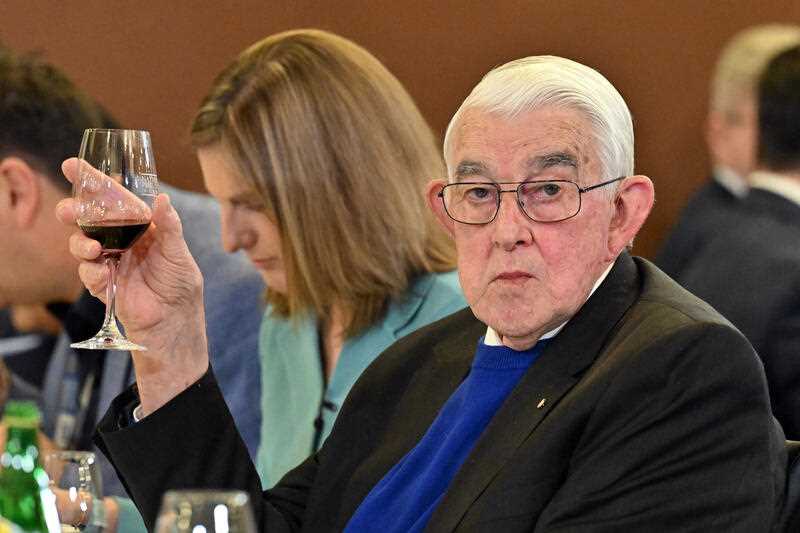John Kerin was Australia’s longest-serving and widely respected primary industries minister.
But politics are cruel and he’ll probably be better remembered for his stumbling performance as treasurer during the febrile months between Paul Keating’s first and second challenges against Bob Hawke.
Mr Kerin, a big, powerful man with a quirky intelligence, was all but destroyed politically by the experience.
John Charles Kerin, who has died aged 85, was born on November 21 1937 in Bowral, the NSW Southern Highlands town where Don Bradman grew up.
His death was noted by Prime Minister Anthony Albanese in parliament on Wednesday.
A chicken farmer (he was reputed to be able to hypnotise chooks) and axeman, Mr Kerin gained arts and economics degrees as an external and part-time student and became a research economist with what’s now the Australian Bureau of Agriculture and Resource Economics.
He married Barbara Large and they had one daughter. After the marriage was dissolved in 1981 he married June Verrier.
Like many contemporary Labor luminaries, Mr Kerin joined the party largely because he opposed the Vietnam war.
He won the seat of Macarthur in the 1972 election that brought Gough Whitlam to power, but lost it in the 1975 Fraser landslide.
He went back to ABARES, despite the opposition of some senior officials in the Department of Primary Industry. However the minister, the Nationals Ian Sinclair, ruled that he should be re-employed.
When Whitlam left parliament after his 1977 defeat, Mr Kerin took over his seat of Werriwa, although only after a bitter preselection fight with the NSW right.
Over his career he flirted with all the factions, leading the factional warriors to regard him with suspicion.
In 1980 Mr Kerin went to the front bench as primary industry spokesman and kept the portfolio when Hawke came to power in 1983. He became minister for primary industries and energy in 1987, heading one of the super-ministries Hawke created after the election that year.
Mr Kerin’s broad approach during his seven years running farm policy was to shift the emphasis to marketing, to boost research and to reform the myriad statutory marketing authorities, partly through weeding out the political hacks and the vested interests.
He started with the Australian Meat and Livestock Corporation, imposing selection procedures to ensure a broader expertise on its board, splitting research off to a separate board and generally requiring the organisation to act more commercially and transparently.
That became the model for other authorities.
Dairy was his most fiery issue as he tried to reform the highly protected and restricted industry, in which Victoria, the most productive and efficient state, couldn’t sell into NSW.
He needed police protection at several meetings with dairy farmers.
Wool was another big headache, for which Mr Kerin partly blamed himself. Peter Walsh, finance minister at the time, believed the nation’s best-ever primary industry minister tarnished his reputation by failing to defy vested interests and take decisive action quickly enough.
The great problem was the old Country Party-initiated Minimum Reserve Price scheme which Mr Kerin – as he later admitted – exacerbated by removing the need for the Wool Corporation to get ministerial approval before setting the reserve price.
In 1988 the corporation set the price at 870 cents, which quickly became unsustainable. Over the next two years the corporation spent a $2 billion market support fund, plus $2.5 billion in loans, to buy up what amounted to one year’s production.
Mr Kerin finally forced a reduction to 700 cents but, although hundreds of millions more dollars were spent, the price couldn’t be held.
As he later put it: “The buyers looked at the size of the stockpile the industry had bought itself, did its sums, and the MRP collapsed”.
After Mr Keating’s first leadership challenge in June 1991, Mr Hawke needed a new treasurer and he chose Mr Kerin over Ralph Willis largely for geographical balance as all the leadership positions were held by Victorians.
Mr Kerin couldn’t handle the pressure, particularly the white-anting by Mr Keating’s supporters.
His self-deprecating style and refusal to claim Keatingesque infallibility soon had him in trouble. When asked if the recession was over, he replied: “Your guess is as good as mine”.
He was ridiculed when he couldn’t think what the initials GOS (Gross Operating Surplus) meant.
The late John Button said he was a prisoner of treasury.
The then-industry minister said in his memoir: “Once he came round to my office for a chat. `I’m not supposed to be here,’ he said. `Treasury officials don’t want me to talk to you’.”
Mr Hawke later wrote: “I could see John was being destroyed and knew that he had to be moved”.
“Here was this huge, physically powerful human being, intelligent, gentle, humorous and as decent as any person in the parliament, reduced to a political corpse by enemies who had now become carrion crows.”
Mr Kerin was transport and communications minister for three weeks, until Mr Keating’s second challenge succeeded. The new PM made him trade minister, but dropped him from cabinet. He quit parliament at the 1993 election.
After politics, Mr Kerin held positions on several farm-related bodies, including the meat and livestock corporation.
He kept a sharp eye for humbug, for example: “Many business people have excessive expectations of Canberra, given that they desire Saudi Arabian tax rates, Japanese interest rates, Antarctic inflation rates, Mali’s wage rates and Panamanian political processes”.
And he grew ever more disillusioned with Labor, resigning from the party in August 2011 because, he said, the machine men at the top had become too powerful and ordinary members were reduced to handing out how-to-vote cards on election day.
However, he rejoined the party six months later and was active within the ACT branch – including handing out how-to-vote cards at the 2022 election.
By Don Woolford in Canberra



